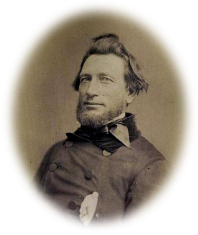2nd.–I think my hospital can boast, just now, the happiest set of sick men I ever saw. I have now twenty-seven of them. This morning, as I was prescribing for them, (all sitting up) some reading the morning papers, and talking loudly over war news, some playing whist, some checkers, some chess, some dominoes–all laughing and merry, Gen. H——— walked in, and, looking for a moment along the line of sick, exclaimed, “What the h–ll have you got here?” “My hospital, General.” “A Brigade,” replied he in his roughest manner, “of a d–d sight better men than you have left me. Where are your sick, sir?” “All here, sir.” “Well, this beats anything I have seen in the army, and if you give your men such beds and such comforts as this, you will have every man of your regiment in hospital before a month.” They have had a glorious holiday. The boxes, and other presents received within the last eight days, have awakened vivid recollections of home, and of “the girls they left behind them.” They are all the better for these things, and when I return them to their quarters, they take hold of their work with a will, and with a feeling that if taken sick, they have a pleasant hospital to go to.
I make here a record of some observations in relation to “hospital fevers,” “hospital sores,” “foul air of hospitals,” and such clap-trap. I have lately visited many tent hospitals, in the open field, where I have witnessed cases of “hospital gangrene,” low typhoid fevers, with gangrenous toes or fingers dropping off, and heard scientific men, in scientific discussions, attributing it all to the foul air of the hospital! And this, too, in the open field, where not more than thirty or forty were together, and where the wind swept past them, free as the fresh breezes on the top of the Alleghanies!! ‘Twas a gangrene of the mind, for want of free ventilation of the brain. There is no disease so contagious, or so depressing to vital energy when taken, as inactivity and gloominess of mind. Introduce one such temperament into your hospital, without an accompanying antidote, and the condition will be communicated to all others in the hospital, with as much certainty, and with greater rapidity, than would the infection of small-pox or measles. Let the admission of such a patient be accompanied by the presence of a long, sour-faced hospital steward, who keeps in the hospital tent a table covered with cups, and spoons, and vials, and pill-boxes, and syringes, and who mingles with every potion he gives a homily on hospital sickness, on fatality in the army, on the number of deaths from typhoid in the next tent, and my word and observation for it, though the breezes of that hospital come fresh “from Greenland’s icy mountains,” they will be freighted with the mephitic vapors of hospital fever and gangrene.
Instead of the above, let the Surgeon pass frequently through his hospital, making it a rule never to leave till he has elicited a hearty laugh from every one in it. For his Steward’s table of mirth-repelling instruments, introduce light reading, chess-men, checkers, dominoes, cards, puzzles, their use to be regulated by a corps of jolly, mirth loving, but judicious nurses. Then let him throw up the bottoms of his tent walls, giving everything around an air of cheerfulness, and if he does not find the diseases of the field hospital milder and more tractable than at home, my word for it, it will be in consequence of the officious over-dosing by the doctor. I do not mean that cleanliness is not an essential; but I must bear in mind that a pile of nasty, out-of-place rubbish, is as incompatible with cheerfulness, as it is with purity of surrounding air. A clean bed, even, exhilarates the mind, as promptly as it corrects the foul odors of a soiled one. Since I have been in the army, I have lost all dread of the much-talked-of foul air of hospitals, only so far as it is difficult to correct the mental atmosphere about it. This is in reference to its influence on diseases. I have not yet had an opportunity of observing the effects of crowds in surgical wards–that will come before long, and I shall be greatly relieved if I find the same records applicable there.
